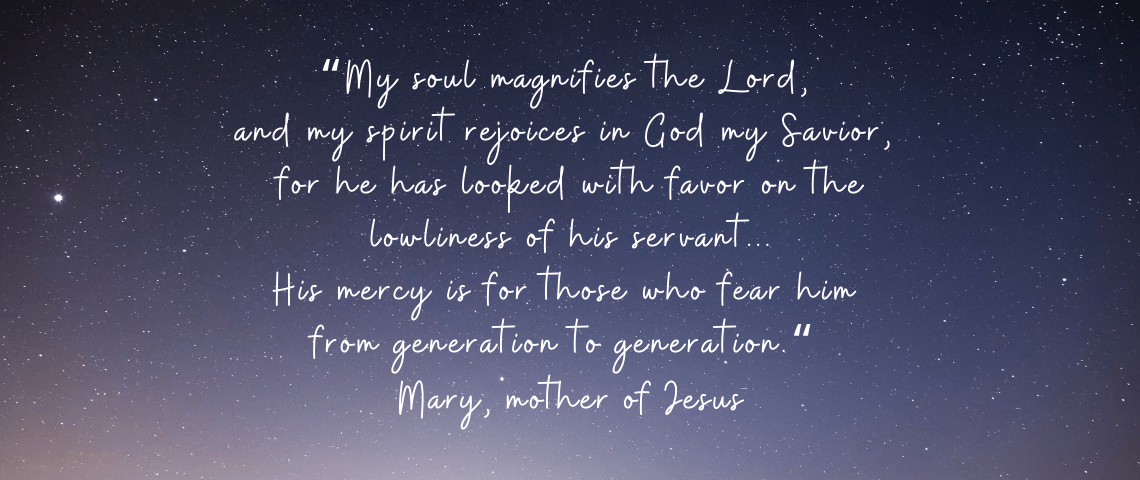The mother of Jesus has been subjected to countless embellishments of the religious imagination–some of them fair, some of them more reflective of the prejudices and projections of the societies from which they came.
Often she appears as a foil to Eve, the redemption of womankind, and the standard of female virtue. Standing triumphantly atop the temptation scene on Notre Dame Cathedral’s western façade is the statue of the crowned Mary, her royal robes grazing the top of the Eve’s head. “What had been laid to waste in ruin by this sex,” Tertullian wrote, “was by the same sex re-established in salvation. Eve had believed the serpent; Mary believed Gabriel. That which the one destroyed by believing, the other, by believing, set straight.”
That a woman who managed to be both a virgin and a mother is often presented as God’s standard for womanhood can be frustrating for those of us who have to work within the constraints of physical law. Indeed, visions of Mary’s virtue have been amplified through the centuries, far beyond what we find in the biblical text… It’s as though, over time, Mary’s feet have gotten farther and farther off the ground.
Much could be said in contrast about the ‘real Mary’ of the biblical narrative: the teenage girl from Nazareth who gave birth on a dirty stable floor; the terrified mom who scurried frantically through the streets of Jerusalem, looking for her lost little boy; the woman who had enough influence over Jesus to convince him to liven up a wedding with his first miracle of turning water into wine; the grieved mother who wept in the shadow of the cross.
But perhaps the most revealing glimpse into Mary’s true character can be found in the Magnificat…a bold and subversive prayer that reveals her own hopes for this special child and the future of Israel:
My soul glorifies the Lord and my spirit rejoices in God my Savior, for he has been mindful of the humble state of his servant.
From now on all generations will call me blessed, for the Mighty One has done great things for me—holy is his name.
His mercy extends to those who fear him, from generation to generation. He has performed mighty deeds with his arm; he has scattered those who are proud in their inmost thoughts.
He has brought down rulers from their thrones but has lifted up the humble. He has filled the hungry with good things but has sent the rich away empty.
He has helped his servant Israel, remembering to be merciful to Abraham and his descendants forever, just as he promised our ancestors.”
(Luke 1:46-55, NIV 2011)
With this prayer, we encounter Mary as Theotokos—the Mother of God, a Greek term that sends many Protestants running for their commentaries, but which beautifully connects the humanity of Mary with her divine call. It comes from the Orthodox Church, and more accurately means “God-bearer” or, “the one who gives birth to God.”
Theotokos refers not to Mary as the mother of God from all eternity, but as the mother of God incarnate. She is what made Jesus both fully God and fully man, her womb the place where heaven and earth meld into one.
At the heart of Mary’s worthiness is her obedience, not to a man, not to a culture, not even to a cause of a religion, but to the creative work of a God who lifts up the humble and fills the hungry with good things…
Like a good Protestant should, I think Mary’s act of radical obedience means more when she is one of us. Imperfect. Afraid. Capable of feeling all the pain and doubt and fear that come with delivering God into the world. But I suspect I may also be a bit of a Catholic, for on the rare occasion that I yield myself fully to the will of God, when I write or speak or do the dishes to magnify the Lord, I start to see Mary everywhere.
Excerpt from “A Year of Biblical Womanhood” by Rachel Held Evans. Used with permission.





6 responses to “Mary of Nazareth: An Advent Reflection”
Great perspective and well done. I love the way she prayed. She was a strong and courageous woman who didn’t just acquiesce as a marionette to the purposes of God. She made a choice, as all of us can, to allow God more room in her life. I love that she had front foot faith, rather than a passive acceptance, the reputation she is tarred with.